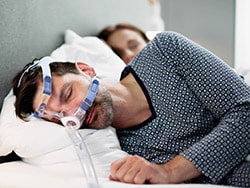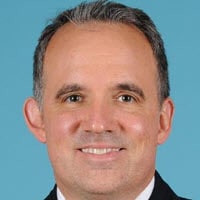Continuous positive airway pressure (CPAP) is first-line therapy for sleep-related breathing disorders (SRBDs). Obstructive sleep apnea (OSA) is the major player in the SRBDs space, with a prevalence approaching 100% in adult men using current diagnostic criteria. Patients with OSA and comorbid cardiovascular disease (CVD) are diagnosed with OSA syndrome, and CPAP is prescribed. Primary care physicians and cardiologists are quick to refer patients with CVD to sleep docs to see whether CPAP can improve CVD-related outcomes.
What the Studies Show
There's a problem though. CPAP doesn't seem to improve CVD-related outcomes. In some cases, it's even harmful. Let's do a quick review. In 2005, the CANPAP study found CPAP didn't improve a composite CVD outcome that included mortality. A post hoc analysis found that it actually increased mortality if central apneas weren't eliminated. The post hoc analysis also found benefit when central apneas were eliminated, but for all-comers, CPAP didn't improve outcomes. Strike one.
Enter adaptive servo-ventilation (ASV). If CANPAP showed success depended on eliminating central apneas, why not use ASV for all patients with CVD and central apneas or Cheyne-Stokes respirations? ASV eliminates central apneas and Cheyne-Stokes. Well, that didn't work either. The randomized, controlled SERVE-HF trial, published in 2015, showed that ASV increases all-cause and CVD-specific mortality. Oops. That's two trials showing that CPAP and ASV can increase mortality in patients with heart failure. Strike two.
Alright. But that's heart failure. What about hypertension or coronary artery disease (CAD)? Shouldn't such patients be treated with CPAP to reduce CVD risk? After all, there's all those surrogate outcomes data for CPAP — it improves vascular tone and lowers catecholamines and all that stuff. Doesn't it lower blood pressure too? Surely CPAP benefits patients with CVD who don't have heart failure, right?
Not really. The RICCADSA study, published in 2016, found that CPAP didn't reduce a composite of CVD outcomes in patients with newly revascularized CAD. The SAVE trial published the same year had a similar design with similar results. CPAP did not improve CVD-related outcomes. Most recently, the ISAACC study was negative. That's three negative randomized controlled trials in less than 5 years showing CPAP doesn't affect CVD-related outcomes in high-risk populations with known disease. Strike three?
CPAP provides no benefit for CVD and possible harm when treating heart failure. Surely CPAP is useful for patients with hypertension. Let's see. The American Academy of Sleep Medicine (AASM) conducted meta-analyses for the guideline it produced recommending CPAP for patients with comorbid hypertension. They note that 24-hour blood pressure measurements are best correlated with outcomes. CPAP did lead to significant 24-hour blood pressure reduction, but guess how large it was? For systolic blood pressure, it was 1.5 mm Hg; for diastolic pressure, it was 1.6 mm Hg. That's it.
How did the AASM summarize and interpret the above data in their 2019 guidelines for prescribing CPAP? Although covered in their detailed review, both heart failure and CVD are left out of their primary recommendations. They do provide a conditional recommendation for prescribing CPAP to patients with comorbid hypertension that states, "The majority of well-informed patients would choose the intervention over no treatment." Really? If you were told that CPAP provides less reduction in blood pressure than dietary changes and/or medications, would you choose to wear it or take a pill once a day? Remember, you have to take the pill anyway to get your blood pressure to target unless your pressure is only 1.5-1.6 mm Hg above normal. Where does one find patients who are anxious to wear a mask to bed for minimal benefit and a 20% copay? I've yet to meet one.

As always, the pressure pushers are undeterred by inconvenient evidence. A secondary analysis of adherent patients in RICCADSA resorts to the "bait and switch" that's propped up CPAP enthusiasts for decades: Compare adherent patients vs those who are not (or those who refuse treatment) to prove benefit. The flaws to this approach are obvious. First, performing a post hoc analysis that reintroduces all of the confounding that plagues existing CPAP data negates the benefits of randomization, fancy statistics notwithstanding. Second, it belies the reality that in well-controlled, well-conducted randomized trials where patients get far more support than those in the community (and sometimes are preselected for adherence), a majority simply won't use CPAP. Excluding the nonadherent or comparing them with the adherent is the epitome of selection bias.
The editorial accompanying the ISAACC study is a tour de force in CPAP apologies. The apnea-hypopnea index (AHI) isn't the right metric — this one's invoked often. Never mind that the very premise that OSA causes CVD is from observational data based on the AHI. If you abandon the AHI, don't you lose your justification for prospective trials targeting CVD with CPAP?
Even better, in an argument fit for a Twitter ban, the author suggests that patients in ISAACC, SAVE, and RICCADSA couldn't benefit because they already have CVD. The very concept, refuted by decades of secondary prevention research in cardiology, implies that CPAP should be used for primary prevention. Only a sleep researcher could spin a negative study into an expansion of CPAP indications. Others in the AASM have made similar proposals.
Final Thoughts
The sleep field lacks unblinded realists capable of choosing wisely. A little therapeutic underconfidence is warranted. Diseases and therapies will always have champions — prudence and restraint? Not so much. The AASM could summarize the CPAP literature in a single recommendation: "If your patient is sleepy, CPAP might help them feel better if their disease is moderate or severe." All other indications are soft.
Aaron B. Holley, MD, is a professor of medicine at Uniformed Services University in Bethesda, Maryland, and a pulmonary/sleep and critical care medicine physician at MedStar Washington Hospital Center in Washington, DC. He covers a wide range of topics in pulmonary, critical care, and sleep medicine.
Follow Medscape on Facebook, X (formerly known as Twitter), Instagram, and YouTube
Credits:
Images: iStock / Getty Images
Medscape Critical Care © 2023 WebMD, LLC
Any views expressed above are the author's own and do not necessarily reflect the views of WebMD or Medscape.
Cite this: CPAP Oversells and Underperforms - Medscape - Dec 22, 2023.












Comments